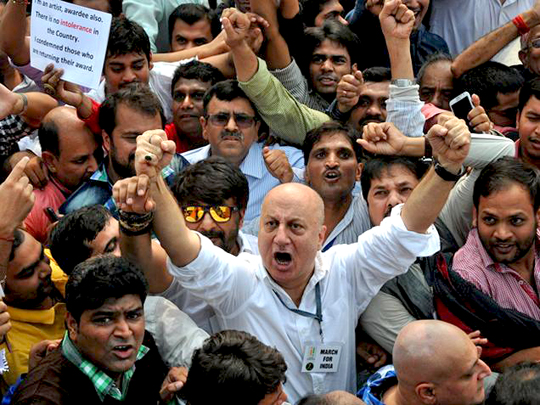New Delhi, Nov 8: Actor Anupam Kher led a march to the Rashtrapati Bhavan on Saturday, alleging that the return of awards by writers, artistes and others against “rising intolerance” was an act to defame the country.

A delegation of a select few artists from the group met Prime Minister Narendra Modi later, who said “Indian culture goes beyond tolerance and talks of acceptance”. The President’s office posted a picture of the delegation’s meeting with him on Twitter.
As the contingent marched down the Rajpath to the Rashtrapati Bhavan, some of the participants burst out against questions posed by media persons, including two women television reporters, leading to ugly scenes.
Many film-makers, artistes and others from the film fraternity, including Madhur Bhandarkar, Ashoke Pandit, Priyadarshan, Manoj Joshi and Abhijeet Bhattacharya, and writer Madhu Kishwar joined what they dubbed the ‘Tolerance March’ to hand over a memorandum signed by over 40 persons to the President.
Woman journalist heckled
Bhairavi Singh, a senior NDTV reporter, was allegedly heckled, harassed and bullied before other media persons intervened and escorted her to a police cordon.
Chief Minister Arvind Kejriwal tweeted in her support later in the day, and the Aam Aadmi Party condemned the march and the episode.
Ms. Singh told The Hindu that the attack on her was “ironic” because it took place at an event at the core of which was an attempt to portray “tolerance” espoused by Indian society.
“This was purely a case of shooting the messenger and nothing more; I not only did not ask any question about paid participation in the rally nor made a query similar in nature to it, but tried my best to give as many interviewees a chance to put their views out there as possible,” Ms. Singh said adding that both she and her channel were likely to press criminal charges.
Anupam Kher expresses regret
Mr. Kher reportedly expressed regret to the channel.
In a statement, the AAP said Mr. Kher and his associates had “set an extremely wrong precedent” by countering the arguments of intellectuals from various walks of life and hurling threats and abuses on them during the march.
The party condemned the “decision by the marchers, a majority of whom appeared to be political workers, not even to spare journalists who were subjected to shameful behaviour.”
Mr. Kher said the protests against “intolerance”, which began with writers returning their Sahitya Akademi awards, showed that rather than addressing their concerns through their respective fields, these people were using the media to hurt the spirit of India.
“We had a meeting with a lot of writers, artistes, filmmakers and they also believe that there is no intolerance in the country ... This march is a symbolic gesture on part of a lot of people over here who say India is one and free of intolerance,” Mr. Kher said.
“Any brutal killing is condemnable. We strongly condemn it and expect swift justice,” he said while reading out their letter to the President.





Comments
Add new comment